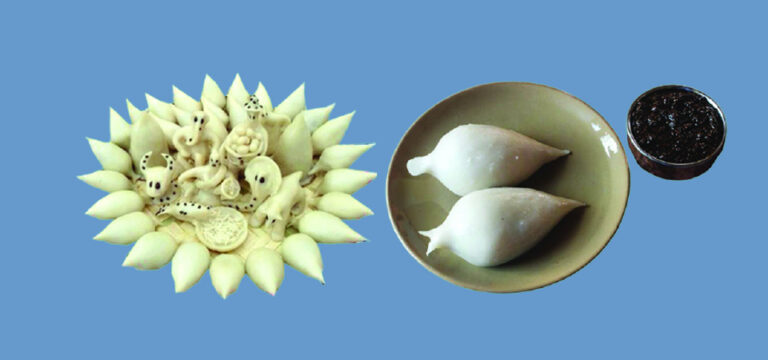
Indigenous Newa communities of Kathmandu and adjoining cities are to celebrate Yomari Punhi, one of the most popular festivals among their communities, on Sunday, worshipping Goddess Annapurna and eating Yomari (a rice flour delicacy).
Yomari Punhi is a Newari festival marking the end of the rice harvest. It falls in November/December on the full moon day in the second month in the lunar Nepal Era calendar. This day is also believed to be the birthday of Guru Dattatraya.
Yomari is made by steaming a confection of rice-flour (from the new harvest) dough shaped like fig and filled with brown cane sugar (chaku) and sesame seeds. The fig shaped dough can also be filled with Khuwa and minced meat.
Yomari is the main item on the menu during the post-harvest celebration of Yomari Punhi. It is believed that eating Yomari beats cold.
It is also believed that celebration of Yomari Punhi brings wealth, health and prosperity.
On this day, people also worship Annapurna, the goddess of grains and food. Children gathered in groups go round the neighborhood to ask for Yomari, performing the customary song ‘Tya Si Tya’
and dancing in the evening. Parents and elders bless children and give kids Yomaris to eat.
Sacred masked dances are performed in the villages of Hari Siddhi and Thecho to mark the festival. Mostly Yomaris are prepared in the form of gods and goddesses like Kumar, Ganesh, Laxmi and Kuber to offer to goddess Annapurna.
The festival is believed to have started from Panchal Nagar (Panauti). It is said Suchandra and Krita, a married couple, first experimented with fresh yield of rice from their field.
Likewise, the Kirat community also observe the Sakela Udhauli festival on the same day.
Under the Hindu Lunar calendar, the festival falls in November/December (full moon day) every year during the winter season.
Kirats in Kathmandu gather at the special Manghim at Sano Hattiban and worship. On the occasion, the community performs a special dance called Sakela.
Rai, Limbu, Yakkha and Sunuwar of Bhojpur, Khotang, Dhankuta, Dharan, Biratnagar, Kathmandu and Lalitpur celebrate the festival.
The festival highlights the agricultural lifestyle of the Kirat people.
Source : TRN,






